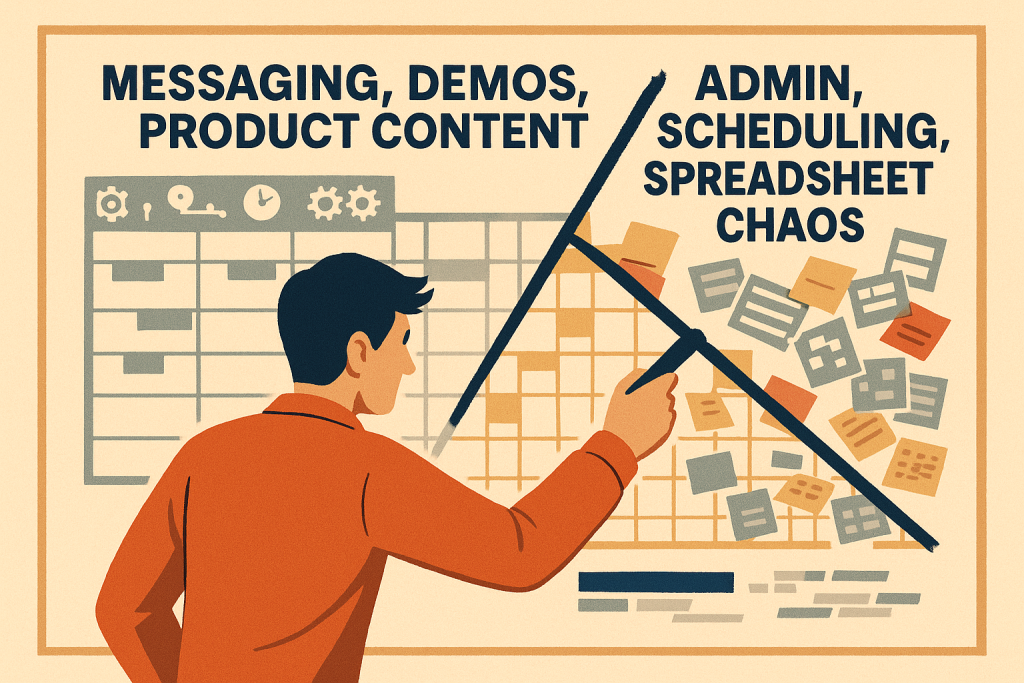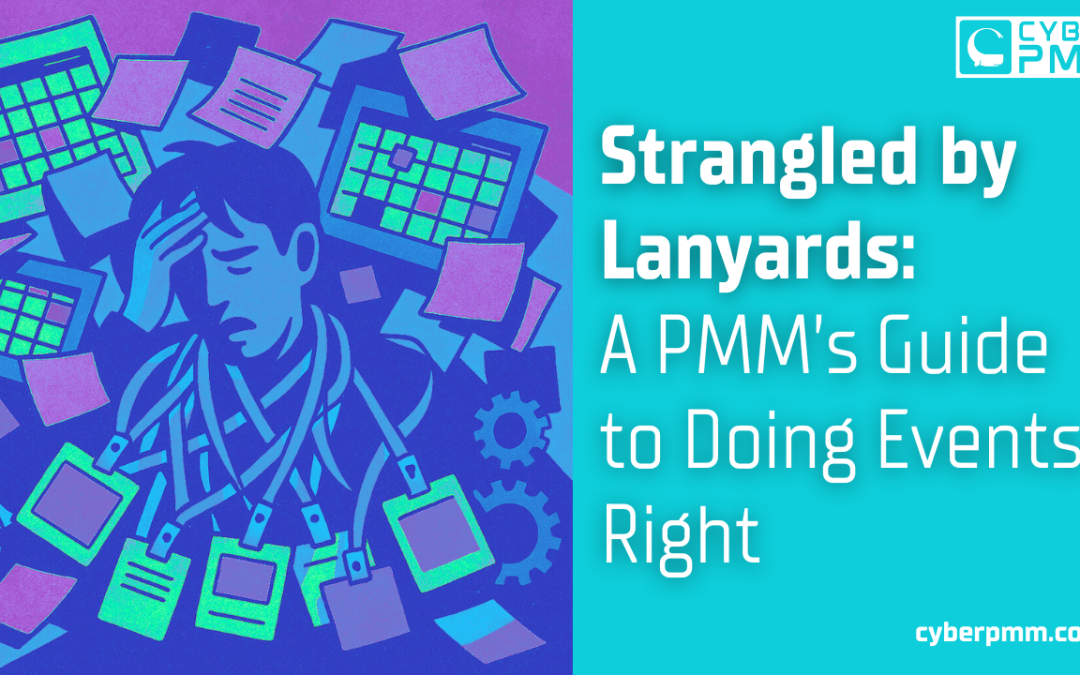How to work with event teams, protect your time, and still show up like the product hero.
Whoa, Events Everywhere!
I’ve been thinking a lot about events lately. Like, way too much. Probably because, at this exact moment, I just survived the RSA Conference and already have four more big events staring me down, including a massive event next week. And I’m realizing something: it feels like a huge chunk of my job these days is just about showing up and making sure we talk about our products right at these things. So how should we collaborate with event teams? Where should we put our energy and where should we draw the line?
Maybe you’re reading this and thinking, “Wait, what? I’m focused on the messaging and strategic side, not this event craziness you speak of.” And hey, good for you. But trust me, if you’re rolling with a mid-size to bigger vendor, events are gonna get real for you quick. I get that startups are somewhat exempt because they don’t show up at as many events but everything is about scale. Even a few industry events for a solo PMM is a beast.

And look, I’m not saying events are bad. Not at all. But it makes you wonder, right? Are we turning into “product event marketers” instead of just regular “product marketers”? I saw this post from Gabe Larsen, Prev. CMO @Kustomer recently, and he had this bullet on his list of what he’s seeing in the marketing wild and how it’s “way messier, and more chaotic than I imagined”:
⇨ 𝐅𝐢𝐞𝐥𝐝 𝐌𝐚𝐫𝐤𝐞𝐭𝐞𝐫𝐬 𝐚𝐫𝐞 𝐞𝐚𝐭𝐢𝐧𝐠 𝐠𝐨𝐨𝐝
CMOs are lost, so they’re panic-punting half the budget into events.
It’s not working but hey, nothing says “strategy” like booths, badges, and bar tabs.Gabe Larson, Prev. CMO @Kustomer
In short, CMOs are kinda scratching their heads about where to spend their budget. They want to see a good ROI, and events? Well, they often show that.
Anyway, after budgets are decided and it comes to actually doing these events, the event or other teams come knocking on our door, the product marketing team, with all sorts of questions:
- What’s our booth message?
- What should we demo?
- Can you manage all the presentations?
- Who are we even talking to at this thing?
- Can you ensure the speaker is armed and ready?
- Is the press release accurate?
- Great, can you explain all this in the company-wide briefing?
- Oh, and everything’s due next week.
We simply have to figure out how to work with the event team.

The Event Machine and Where We Get Lost
Event teams? Among my favorites. They’ve got their act together. They run things like a clock, which makes sense, right? I mean, event dates don’t move (usually). Take the Cyber marketing world, for example. You might have a big boss over all events, and under them, you’ve got four different managers who each handle a different major event and a few ancillary events on the side: RSAC, Black Hat, your annual user event, and then that big partner event. And they’ve got it all planned out way in advance. Goals, strategy, who’s involved, budget–it’s all locked down early.
But here’s where it gets muddy. Once all that’s set, there’s a disconnect. Product Marketers don’t wake up and think, “My main job is to make this event amazing.” And because we don’t really feel like that’s our sole responsibility (because it isn’t), we don’t jump at every request the event team sends our way, and there are many. It can feel like a big distraction, like we’re being pulled away from what we’re supposed to be doing. Especially when everyone’s gotta drop what they’re doing to get ready for this chaotic fire drill that can’t be canceled.
We’re the Secret Sauce of Events
In my experience, when I go to events like RSAC, I see product marketers doing all sorts of stuff: giving demos, doing theater talks, meeting with analysts, handling keynotes, and just hustling behind the scenes. We’re the secret sauce, operating in the background like intel operatives in the dark.
I’m not saying the event managers aren’t important. They are the core of a successful event. But over the last twelve years of doing this, I’ve seen Product Marketing take on a bigger and bigger role at events, and there are just so many more of them to manage!
Let’s list out a typical year (which seems to expand each year), you might have:
- 4 Big Industry Events
- 4 Regional Events
- 1 Big User Event
- 3 Smaller User Events
- 4 Big Partner Events
- 4 Small Partner Events
- 5 Virtual Events
That’s 25 just from the top of my head and in some cases with roadshows, there can be events happening regionally that double this total. All of which need the latest content and product messaging and some need keynotes and breakout content and then all the demos and booth messages. Guess who meets this demand? PMM. Solutions Marketing and Technical Marketing do a lot too for the bigger keynotes, but for the most part PMMs are filling the product content gap here.
This is why we can’t get too involved, though. Where I draw the line is when the events team starts asking me to mess with spreadsheets or schedule talks for others or deal with admin tasks. That’s where you gotta know your boundaries and say, “Nope, that’s not me.” Of course if you’re at a startup, scratch that last statement because you won’t have much of a choice. This is also why soft skills are huge for product marketers because we get pulled in a million directions, and we gotta know how to stay focused.

So, what should we be doing for events?
Well, we should definitely be the face of our product. We’re the messenger, after all. And events are where all the people we want to talk to hang out, whether in person or online. So yeah, we should be giving talks about our products and helping execs with their presentations. But we need to stay focused on the content and not get stuck in the admin stuff. And we need to make sure we’re on top of how our products are shown off at the event, especially the demos—what they’re called, what we’re saying, all that good stuff.
We should also be thinking about how we can use events to launch our product innovations. That means working with PR, the event team, product management, and engineering to make sure everything lines up. We’re like the glue that holds all those teams together when we’re trying to launch something new. And of course, we’ve gotta own the messaging. I know events sometimes have their own messaging briefs, but I think our product messaging should be consistent, no matter what. It shouldn’t just be for a one-and-done event—it should support everything we do.
Working With Event Marketing
So, how do we work with the event team the best? I think it’s about us, the product marketers, stepping up and seeing events as a way to push our product goals. Instead of seeing an event as just another thing on our list, we should think of them as “marketing moments.” We did talk about this before, see here. Where we plan things out around those moments, like one big push each quarter.
So in the Cyber world, you might have RSAC, Black Hat, your user event, and a big cloud event. If you plan your quarterly releases around those, everyone’s gonna be on the same page. Everyone across Marketing gets involved when there’s an event coming up, so it makes sense to have a program manager keeping everything coordinated.
If we do that, we can keep everyone in the loop about product launches with one simple document or page. That way, everyone knows what’s coming and when. The bigger the company, the more important this is. I’ve seen those documents with, like, 30 different releases on them. You’re gonna be competing with other product marketers for attention, but it all comes down to what the company thinks is important and what leadership wants to highlight.
A good relationship with event marketing is all about realizing that events are a big deal. Not every company gets to do them. They’re expensive! Travel costs can be crazy (looking at you, San Fran). So aside from the crushing workloads, we should feel lucky to even be going to events. Events are a PMM “first-world problem.” We should be grateful.
I won’t go into all the details about how to tackle an event—I’ve talked about that before. The main thing is, we gotta work with the event team. They’re giving us a chance to show off our product to a lot of people. We shouldn’t waste that. Yeah, it’s a lot of work. It can be a mess.
One thing people don’t talk about enough is how events make deadlines happen. It’s intense! Travel, deadlines, tons of stuff to do, execs wanting things, PR needing stuff, working with the brand team, technical folks, sales folks, competitive folks—it’s a lot. It can get crazy. But I’ve never flown home from an event without feeling like we did something awesome.
Wrap Up and High Fives to the Event Managers

Events are where everything comes together for product marketers. It’s where the whole team rallies around a mission. It will get messy, but PMMs always pull through. It’s also a chance to look back and see what we’ve done and where we can do better. And it’s a great time to connect with people in real life! You get to meet your teammates, grab dinner, and actually talk face-to-face. I think events are a big deal for product marketers, especially in the Cyber world.
Oh, and I gotta give a shout-out to the event managers! They handle so much. Setting up booths, dealing with all the little details, answering a million questions—it’s not an easy job. When PMMs find a good event manager to work with, it’s like magic. It can make the event a huge success. As we do more events, we gotta take them seriously and see them as a chance to grow, not just a stressful thing we have to deal with. So go and be eventful. You got this.
⤵️ Join the conversation with other Cyber PMMs
- Subscribe to the newsletter on LinkedIn or Substack. (You can also subscribe directly below.)
- Follow Cyber PMM and/or me on LinkedIn.
- Subscribe to the YouTube channel.
- Subscribe to the Podcast on Spotify or Apple.
- Follow on X and @Cyber_PMM on Instagram.


